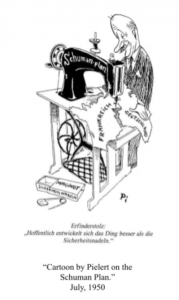As tensions accelerated the United States and the USSR, both rivals initially overlooked France. In 1950, French Minister Robert Schuman proposed an economic integration plan between French, Germany, and the three Benelux countries, which came to be called the European Coal and Steel Community or “The Schuman Plan.” Although less well known than the Marshall Plan, the Schuman Plan marked a significant stride in France’s efforts to integrate more with other Western Powers. Although the Schuman Plan was not backed by Britain, America as well as the countries that were involved believed the formation of the European Coal and Steel Community to be a major turning point for European integration.
In years prior to Schuman’s proposal of the ECSC, French leaders and policymakers had been experiencing some uncertainties with the Marshall Plan since it ultimately placed Germany at the forefront of Europe’s recovery. France had feared that if Germany got too far ahead in recovering from WWII, they would adopt a powerful economy, an American-supplied army, and would then become independent of European cooperation. To suppress this fear, the French economic recovery director Jean Monnet and Robert Schuman developed an idea where France, Germany, and other Western countries could combine their coal and steel industries. In binding to Germany’s coal and steel resources, France would create a new balance of economic power in Europe and relieve itself of the anxieties that Germany would expand beyond the need for European integration. Furthermore,  if the German industry were to grow as rapidly as the French predicted, it would pull France and the rest of Europe along with it.
if the German industry were to grow as rapidly as the French predicted, it would pull France and the rest of Europe along with it.
The Truman administration quickly hailed the plan, dubbing it the European Coal and Steel Community, which the US Ambassador David Bruce described as “the most constructive thing done by the French government since the Liberation.” Between Schuman’s initial motion for a Franco-German union on May 10th of 1950 and the actual execution of the ECSC in 1951, Americans remained in full support of the plan. According to an article from The New York Times, the US secretary of State Dean Acheson issued a statement expressing “sympathy and approval” at the aim to bind French and German coal and steel industries.
The British, however, were more reserved about the plan than Americans, and were ultimately annoyed with France for springing a proposal on them without prior warning. English critics believed that the plan could face the danger of becoming a new kind of cartel arrangement, however, US and French politicians deemed this unlikely since the plan was operated by “a public international authority reporting to the UN.” Other New York Times press coverage suggested that the United States thoroughly understood the “French fears of a reviving Germany,” which made them even more supportive of the plan. Up until the legitimate execution of the European Coal and Steel Community, Washington remained a firm believer in a Franco-German partnership that would open up new doors for France while also confirming peace between the European nations. Additionally, the United States knew that if they supported the Schuman Plan, it would exert democratic morals on the West and attract nations exploited by the Soviets. Overall, Schuman’s proposal of the European Coal and Steel Community created both positive attributes for France and the United States and ultimately worked as an important next step for accelerating Western powers to the forefront of the Cold War.
Works Cited:
Daniell, Raymond.“Paris steel plan aim backed by Acheson on eve of parley: Bilateral talks ended Acheson Supports Aim of Paris Plan.” NEW YORK TIMES , May 11, 1950: pg 1
Hitchcock, William. “The Marshall Plan and the Creation of the West.” In The Cambridge History of the Cold War, edited by Melvyn P. Leffler and Odd Arne Westad, The Cambridge History of the Cold War. Cambridge: Cambridge University Press, 2010: 154-74.
New York Times. “Another Bold New Plan.” New York Times,, May 11, 1950: pg 28
“Cartoon by Pielert on the Schuman Plan.” CVCE.EU by UNI.LU, 7 July, 1950. Accessed February 13, 2021. https://www.cvce.eu/en/obj/cartoon_by_pielert_on_the_schuman_plan_7_july_1950-en-2c173fa9-4235-4da4-b8eb-c5bd5678cd89.html.
